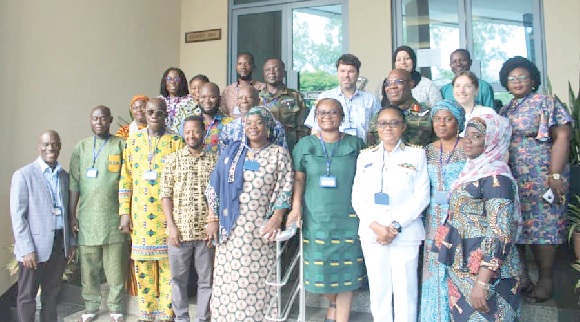
Ghana must leverage on peacekeeping experiences — Professor Asante
A lecturer at the Institute of Africa Studies(IAS) of the University of Ghana (UG), Professor Richard Asante, has urged security services to leverage their peacekeeping experiences to improve domestic peace and security.
He indicated that Ghana’s exceptional performance in peacekeeping missions of the military and police, as exhibited in their use of dialogue and diplomacy even in situations where they had the capacity to use force, coupled with the current security architecture and infrastructure, offered enough experience to handle pockets of disputes in the country.
He said the insecurities experienced in the country had contributed to Ghana’s drop from second most peaceful country in Africa in 2021-2022 to fourth place last year, according to the Global Peace Index (GPI).
Prof. Asante was speaking at the opening of a two-day conference organised by the IAS of the UG, in collaboration with the Danish Institute for International Studies (DIIS) and the Kofi Annan International Peacekeeping Training Centre (KAIPTC) in Accra last Wednesday.
The conference, dubbed: “From International Peacekeeping to Policing Local Resources Conflicts: What are the lessons for Ghana’s Security Services?” was attended by security experts and researchers.
Concerns
Prof. Asante expressed concern about the proliferation and availability of small arms and light weapons that had increasingly been in circulation, and in use by unauthorised individuals, particularly non-state actors, over the last two decades.
“If you look at the statistics out there, it's quite frightening in the case of Ghana. In 2004, we had 240 small arms in circulation. By 2014, it had surged to 2.3 million. In 2024, the estimate shows that there is an upward trend; and in all the conflicts in Ghana, be it chieftaincy, political violence, vigilantism, among others, small arms played a central role in all these conflicts,” he said.
He added that globally, there was talk about democratic crisis arising from challenges to peace and security.
However, he said, that was more acute in Africa, according to a number of research findings from Freedom House survey, Variety of Democracy survey, Afrobarometer, and Mo Ibrahim indicators.
He said the persisting economic downturns had contributed to the surge in insecurity as the chunk of young people especially were exploited by politicians and ethnic entrepreneurs to pursue violence.
Prof. Asante added that the government must pay attention to the economic situation, coupled with the security leveraging international peacekeeping experiences to be able to complement the existing peace infrastructure for improved domestic security.
Recommendation
As a recommendation, he urged the National Peace Council, together with the National Commission for Small Arms and Light Weapons, to be supported with the necessary logistics and resources, especially the Peace Fund that was launched recently to be able to reach parties in conflicts and curtail the production.
He added that there was the need for civil society organisations to deepen collaboration and continue to work with faith-based organisations to promote peace in the country.
